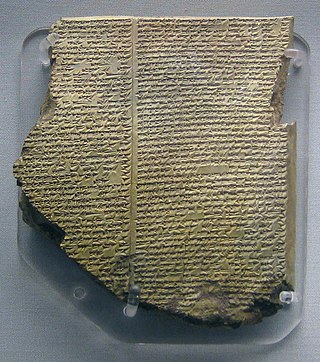Related Research Articles

An epic poem, or simply an epic, is a lengthy narrative poem typically about the extraordinary deeds of extraordinary characters who, in dealings with gods or other superhuman forces, gave shape to the mortal universe for their descendants.
In poetry, enjambment is incomplete syntax at the end of a line; the meaning 'runs over' or 'steps over' from one poetic line to the next, without punctuation. Lines without enjambment are end-stopped. The origin of the word is credited to the French word enjamber, which means 'to straddle or encroach'.
In poetry, metre or meter is the basic rhythmic structure of a verse or lines in verse. Many traditional verse forms prescribe a specific verse metre, or a certain set of metres alternating in a particular order. The study and the actual use of metres and forms of versification are both known as prosody.

Frederic Ogden Nash was an American poet well known for his light verse, of which he wrote more than 500 pieces. With his unconventional rhyming schemes, he was declared by The New York Times to be the country's best-known producer of humorous poetry.

Poetry is a form of literary art that uses aesthetic and often rhythmic qualities of language to evoke meanings in addition to, or in place of, literal or surface-level meanings. Any particular instance of poetry is called a poem and is written by a poet. Poets use a variety of techniques called poetic devices, such as assonance, alliteration, euphony and cacophony, onomatopoeia, rhythm, and sound symbolism, to produce musical or incantatory effects. Most poems are formatted in verse: a series or stack of lines on a page, which follow a rhythmic or other deliberate pattern. For this reason, verse has also become a synonym for poetry.
A quatrain is a type of stanza, or a complete poem, consisting of four lines.
A rhyme is a repetition of similar sounds in the final stressed syllables and any following syllables of two or more words. Most often, this kind of rhyming is consciously used for a musical or aesthetic effect in the final position of lines within poems or songs. More broadly, a rhyme may also variously refer to other types of similar sounds near the ends of two or more words. Furthermore, the word rhyme has come to be sometimes used as a shorthand term for any brief poem, such as a nursery rhyme or Balliol rhyme.
Terza rima is a rhyming verse form, in which the poem, or each poem-section, consists of tercets with an interlocking three-line rhyme scheme: The last word of the second line in one tercet provides the rhyme for the first and third lines in the tercet that follows. The poem or poem-section may have any number of lines, but it ends with either a single line or a couplet, which repeats the rhyme of the middle line of the previous tercet.
Jocelyn Henry Clive 'Harry' Graham was an English writer. He was a successful journalist and later, after distinguished military service, a leading lyricist for operettas and musical comedies, but he is now best remembered as a writer of humorous verse in a style of grotesquerie and black humour.
Articles related to literature include:
A virelai is a form of medieval French verse used often in poetry and music. It is one of the three formes fixes and was one of the most common verse forms set to music in Europe from the late thirteenth to the fifteenth centuries.

This glossary of literary terms is a list of definitions of terms and concepts used in the discussion, classification, analysis, and criticism of all types of literature, such as poetry, novels, and picture books, as well as of grammar, syntax, and language techniques. For a more complete glossary of terms relating to poetry in particular, see Glossary of poetry terms.
This is a glossary of poetry terms.
Christian Victor Noel Hope Hely-Hutchinson was a British composer, conductor, pianist and music administrator. He is best known for the Carol Symphony and for humorous song-settings.
Perfect rhyme — also called full rhyme, exact rhyme, or true rhyme — is a form of rhyme between two words or phrases, satisfying the following conditions:
John Sandes was an Australian poet, journalist and author.

Light is an online journal which bills itself as "America's oldest and best-known journal of light verse."
Virginia Margaret Graham was a London-born English writer, critic and poet, whose humorous verses on Second World War subjects were republished in London by Persephone Books in 2000 as Consider the Years 1938–1946. The first edition was published in 1946 by Jonathan Cape. She had a long correspondence with Joyce Grenfell, which was later published.
Poetic devices are a form of literary device used in poetry. Poems are created out of poetic devices via a composite of: structural, grammatical, rhythmic, metrical, verbal, and visual elements. They are essential tools that a poet uses to create rhythm, enhance a poem's meaning, or intensify a mood or feeling.
Cruel jokes is a joke cycle dealing with cruelty and macabre topics. They belong to the category of sick humor. Typical examples:
References
- 1 2 McKenty, Bob. "Spectrum: Little Willies". Light . Retrieved 19 December 2019.
- ↑ Streamer, Col. D. (1901). Ruthless Rhymes for Heartless Homes. New York: R.H. Russell.
- ↑ "Little Willie". Glossary of Poetic Terms. Poets' Graves. Retrieved 19 December 2019.
- ↑ Robbins, F.N. (1904). The Willie Ballads with other Limericks and Nonsense Rhymes. Columbia, South Carolina: R.L. Bryan Company. p. 9.
- ↑ "Give us the Willies". The Washington Post . Retrieved 19 December 2019.